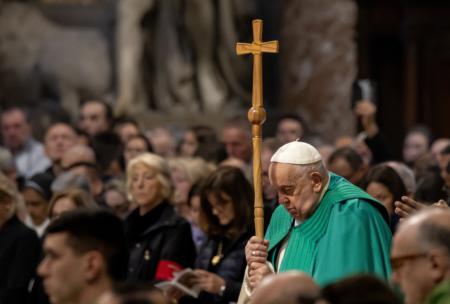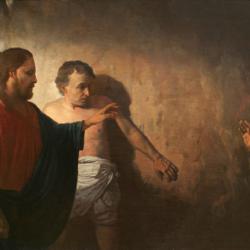Why Catholic thinkers say the push for contraception is stale
Washington D.C. (CNA/EWTN News) -- Modern-day imperialism. Harmful to women. A failed promise. These are the ways that leading Catholic scholars described contraception -- and said the Church is right to warn against it.
"What women have discovered over the past 48 years is that we don't have a design flaw. Being a woman is good enough, and it's a wonderful thing," said Mary Rice Hasson, J.D., director of the Catholic Women's Forum at the Ethics and Public Policy Center.
Hasson was among a group of more than 500 Catholic scholars who signed a document supporting Church teaching against contraception, as expressed in Blessed Paul VI's 1968 encyclical Humanae Vitae.
The document, entitled "Affirmation of the Catholic Church's Teaching on the Gift of Sexuality," was released at a Sept. 2016 press conference at The Catholic University of America in Washington, D.C.
It responded to a statement opposing Church teaching, released by the U.K.-based Wijngaards Institute. The 150 signatories of the dissenting statement argued that the Church has no reason for its teaching against contraception. They said that the use of birth control is sometimes "an ethical imperative" and that abortion-causing methods of contraception are sometimes acceptable.
Pope Paul VI's 1968 encyclical Humanae Vitae reaffirmed the traditional Christian rejection of contraception and said it applied to the birth control pill. If a married couple faces a just reason to avoid pregnancy, the Church teaches that they may do so through Natural Family Planning, a process that works with a woman's natural fertile cycles and abstaining from sexual activity during the times that she is fertile.
Hasson voiced gratitude for the Church's teaching, saying that it affirms women and does not treat their bodies as "broken."
"From a woman's perspective, contraception, abortion and the sexual revolution were held up to be a situation of promise, opportunity, of a way to move forward in equality," she said.
"And what we've found, not looking just through the eyes of faith, but our lived experience has shown that this is a false promise. In fact, women have proved to be hurt and more vulnerable by the consequences of the sex revolution and the promotion of contraception as the solution."
Rather than affirming women, Hasson said, contraception tells women that their fertility is a problem to be "fixed" through medical means.
In contrast, the Church's teaching protects and defends women, she said. "We are the future. Women have the support of the Church's teaching and it's been just a tremendous thing."
Hasson told CNA that both domestic and foreign organizations are "very coercive" in pushing contraceptive implements on lower-income women around the world, often without regard for women's relationship goals and at the cost of other forms of developmental support.
Religious studies professor John Grabowski of Catholic University of America agreed.
He told CNA that during his time serving on the Pontifical Council for the Family, he has heard people from around the world complain that "we are having these population, family planning services shoved down our throats, regardless of our convictions, our cultural values, our religious convictions."
In many cases, he said, funding is directly tied to acceptance of contraception and abortion programs. "It really is contraceptive imperialism."
Grabowki, who also signed the document supporting Church teaching, pointed out that every major Christian church agreed with Catholicism through the 20th century.
And today, he said, "there are many Catholic scholars, academics and intellectuals who support the Church's teaching, who recognize that the teaching is not the policy instituted by the Church 48 years ago, but represents the constant teaching of the Church from its beginning."
Grabowksi noted that when Pope Paul VI wrote Humanae Vitae, he "predicted that if contraception were to be widely implemented we could expect a number of things to come to pass: increasing infidelity, and the overall moral decline within society, a loss of respect for women on the part of men."
All of these things have come to pass, Grabowski said, charging that the Wijngaards Statement does not recognize "the fact that we have a wealth of data from the sciences and the social sciences demonstrating the real harm done to women, to relationships, to marriages and to the family. It's as if the sexual revolution hasn't happened."
He also pointed to the statement's failure to address the "unique contribution" of St. Pope John Paul II's Theology of the body, a work which he described as "such a rich resource in unpacking this teaching."
Statement organizer Janet Smith, an ethics professor at Sacred Heart Major Seminary in Detroit, noted that with just a few days' notice, the document in support of Church teaching had attracted more than triple the signatures of the dissenting statement.
She suggested that this is "an opportunity for us to show the world that there are many, many people who accept the Church's teaching on contraception."
Furthermore, she said, while all of the signatories hold advanced degrees, they are also largely people who are married with families.
By living out the Church's teachings on contraception and sexuality in their daily lives, many of the signatories are a living witness to the truth of the Church's position, she said. "They're not just accepting it on blind obedience."
Kevin Jones contributed to this report.



















